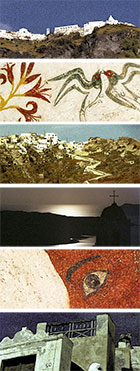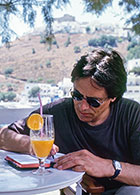
TRAVELS IN ELYSIUM
by William Azuski
About Travels in Elysium
When young Nicholas Pedrosa lands the job of a lifetime as an archaeologist’s apprentice on a Greek Aegean island, the horizon is blue, his dreams limitless; he’s escaped a life of slow death in the grey English provinces.
Yet landing on the scarred volcanic island of Santorini, his expectations are abruptly dashed as he blunders into a funeral procession — that of his own predecessor.
Thus begins a chain of events that seems purposely designed to undermine his confidence in people’s motives and conduct, in the meaning of truth, even in the nature of reality itself. Nothing is quite what it appears to be on this island that famously boasts more churches than houses, sheer drops from thousand-foot cliffs, bubbling lava vents, sporadic earth tremors, and an everyday reality so intertwined with myth and folklore it is often impossible to pull the threads apart. Neither the job he applied for, nor its relentless demands upon him. Neither his boss, the autocratic yet strangely mesmerising Marcus James Huxley, nor the ancient Minoan city that is being raised on the island’s southern peninsula.
Buried under a 100-foot blanket of volcanic ash, the ancient city has been preserved like a fly in amber, yielding frescoes so exquisite it’s been said that an ancient people once created here an image of heaven on earth. But then, on one fateful day some 3,500 years ago, this luminous civilisation was extinguished in an instant that still seems to resonate through time, the erupting volcano tearing the island apart with the force of a 100,000 Hiroshimas.
Yet digging down through the ash that has preserved streets, houses and temples virtually intact, they find a city that is eerily deserted. Where are the entombed bodies, victims of a panic escape, people turned to stone by the falling ash? Everything has been neatly put away, amphorae, cooking utensils, grains and spices. Of the living or the dead, there is not a single trace, neither a fallen body nor even an animal bone.

As Huxley pursues his forensic investigation over the peninsula, reconstructing events in the hours and days before the ancient island met its doom, the psychological pressure he exerts upon his young apprentice tightens relentlessly, notch by notch. Pressures his dead predecessor knew only too well. What does Huxley want from his new apprentice and why? Can this broken ruin of an island really be the remains of Plato’s Atlantis, as Huxley now secretly plans to proclaim to the world — or is that, too, just another elaborate deception? What great secret is the archaeologist hiding, as the dig advances over the peninsula with an almost reckless haste?
Over his head, out of his depth, Nicholas Pedrosa suddenly finds himself in the middle of two great mysteries, one ancient, the other numbered in days. Yet as he discovers through experiences that are at times shocking and at times sublime, it is in Plato’s mind, and in his metaphysical genius, that the ultimate answer to the mystery resides.
★
Travels between islands, mythical, legendary, real... The location and inner meaning of Plato’s lost legendary Atlantis... Classical themes of freedom, the destiny of the soul, life and death, and the nature of reality. One could hardly hope for a richer trove of discussion topics. We hope these few pages will act as something of a companion guide to the Travels; and that they will enrich your reading experience and your own journey along the way... As archaeologist and author JM McDowell states in her review of the Travels: “We are with ‘Nico’ on his journey. We are meant to question not only what we read and what it means, but also our own preconceptions and ideas.”
Discussion Questions
Critical Acclaim
“Alternately lyrical, allegorical, sensual and spine-tingling, William Azuski takes the reader on an exciting voyage of discovery, an allegorical tale of the search for the very meaning of existence. It takes the reader to that place where myth, mysticism, nature and human obsession converge. [...] It is a journey worth taking. Four trowels* for William Azuski’s marvelous Travels in Elysium.”
— Bill Gresens, Book Reviews, Mississippi Valley Archaeology Center, University of Wisconsin.
* Four trowels = run right out to your local book store and buy the hard cover!
“This extraordinary novel, part murder mystery, part metaphysical thriller, kept me guessing until the very last page. The intellectual duel between the troubled hero and his ruthless mentor is mesmerising. William Azuski’s treatment of the Atlantis legend is completely original and I have rarely read a novel with such a strong sense of place. The bizarre landscapes of Santorini and the daily lives of its people, both ancient and modern, are vividly evoked. Anyone who enjoys the work of Umberto Eco, Orhan Pamuk or Carlos Ruiz Zafón should try this book.”
— Geraldine Harris, author, Egyptologist, and a member of the Faculty of Oriental Studies at the University of Oxford.
“Mr Azuski is a master at setting the scene and placing the characters and action in the landscape. [...] The narrative of the excavation is cleverly entwined with the mythology of the afterlife and there is a good twist in the plot. [...] All in all an excellent book which I could not put down and a recommended read for anyone interested in Greek culture!”
— Archaeologist and historian Haighleagh Winslade.
“Like Eco and García Márquez, Azuski conjures a remarkable sense of an exotic place. The reader is immersed in the sights, sounds, smells, tastes, and feel of Santorini under the military junta of the early 1970s and in the mystical reality that intersects with the mundane world. [...] His characters are complex and offer insights into the mysteries and ancient puzzles that surround them as they delve into a lost city—and into their own thoughts and beliefs.”
— Archaeologist and author JM McDowell.

About the Author
William Azuski was born in the United Kingdom, and is of British andYugoslav descent. Travelling widely through the Mediterranean since childhood, his frequent sojourns in Greece included several months on Santorini in the 1970s, an experience that provided firsthand experience for this exceptional novel’s local setting. Writing as William Miles Johnson, Azuski is also author of the critically‐acclaimed The Rose‐Tinted Menagerie, an Observer Book of the Year (nonfiction), and Making a Killing, an end of the world satire, both titles recently republished by Iridescent in ebook form.